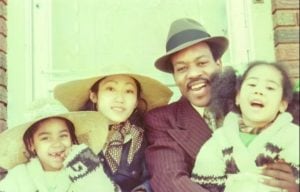
The late Titi Branch, left, and his sister, Miko, co-founded the Miss Jessie’s line of natural hair-care products. (Photo: Miss Jessie’s)
Tears fall from Miko Branch’s eyes as she talks about her late sister and business partner, Titi Branch. Together they co-founded the widely popular natural hair-care line Miss Jessie’s.
“I don’t know if everyone knows how generous and how kind Titi was,” Miko says. “Titi wanted to share with the public how to do their hair.”
Titi committed suicide in December after a long bout with depression. She was 45. Miko talked about her pain, their upbringing and how they turned a small startup into a multimillion-dollar company as part of her national book tour for Miss Jessie’s: Creating A Successful Business From Scratch — Naturally (Amistad/HarperCollins).
“My dad was terrified, because when he grew up he saw what happened to women,” Miko says. “I knew he wanted different for Titi and I. He literally scared us into not being dependent.”
Raised by a Japanese-American mother and black father in Queens, N.Y., Miko not only attributes their success to their upbringing, but also to their location. Despite a growing drug problem, Queens was a great place for a young entrepreneur, she explained. The Branch sisters came of age during the birth of hip-hop, which gave them a chance to bump into emcees like Q-Tip and Phife Dawg of A Tribe Called Quest, Roxanne Shante and members of Run DMC. This helped them visualize possibilities.
Switching From Fashion to Hair

Titi, left, and Miko with their parents, Jimmy Branch and the former Karen Matsumoto. (Screen shot from Miss Jessie’s Original video tribute)
At one point, Miko says she wanted to go into fashion, but decided to go another route. On the day that she graduated from the Fashion Institute of Technology in New York City, she enrolled in beauty school. Known in the neighborhood for being good at doing hair, she and her sister eventually went into the salon business.
“[We decided] we we’re going to team up and use our God-given talent,” Miko says of her partnership with Titi, who had studied consumer economics at the University of Maryland. “I think that was the right decision, because Titi and I have supported the whole family.”
Miko’s first salon consisted of a single chair in the living room of their Brooklyn apartment, where they swapped out the bathroom sink for a shampoo bowl. In 1997, Titi found a site for their Curve salon on Bond Street in the Boerum Hill section of Brooklyn and then another location two blocks away, two years later. While navigating the business of hair, the sisters made “hasty” decisions that cost them their salon and were left doing hair out of their home again. As the Branch sisters describe in the book, they reopened the salon on the parlor level of a brownstone they purchased in Bedford-Stuyvesant in 1999 and lived on the third floor.
“Honestly, many people didn’t come and they thought that somehow the services were less than, because we were doing work in the ’hood,” Miko recalls. “It was a tough time, because I found out that I was pregnant.”
“There would be no Miss Jessie’s if I hadn’t had my son,” says Miko, who was going through her own hair struggles while juggling parenthood and being a beautician. She credits her son, Faison, born in May 2000, for helping her learn to love her natural hair. Bath-times with her splashing son made her acknowledge that she could never have hair like her Japanese-American mother.
“I was trying to emulate my mother, because her hair was straight,” Miko says. But as a new mother, it became impractical to wear straight styles so she left her hair free flowing in its natural, curly state.
“My clients said, ‘How did you get your hair like that?’ I realized that this was something,” she says, gesturing to her hair. “I didn’t know what to call it, but I knew I had to jump on it quick.”
Creating Miss Jessie’s

Miss Jessie’s signature product is its Curly Pudding, a firm-hold styling cream launched in 2004, flanked here by the Curly Meringue, a medium-hold styler, and Rapid Recovery Treatment. (Photo: Miss Jessie’s)
Soon enough, Miko and Titi were at the drawing board trying to figure out a way to create a line of products to offer women the curly, full styles that they came to love. Miko said that she and Titi were not chemists, but they experimented with ingredients in their kitchen. Like many women, as they noted in the book, they went through “countless bottles of creams, curl activators, mousses, greases, hair sprays, gels, conditioners and oils.”
“Titi used to stay up late at night,” Miko recalls. “At 3 a.m. one morning, she showed me what you all know to be Curly Pudding. All the things that led to that moment were so much bigger than my sister and I.”
Titi and Miko named their company after their paternal grandmother, Jessie Mae Branch, a strong influence who showed her love in many ways, from baking peach cobbler to making egg and mayonnaise treatments for their hair during summer visits to her home in Poughkeepsie, N.Y.
“There wasn’t a lot of money flowing through our house, but that did not stop Miss Jessie from being resourceful,” Miko says.
And the rest is history.
After the launch of Curly Pudding in 2004, Miss Jessie’s hair-care products took off, becoming a staple in the natural hair community and one of the first natural hair-care lines sold in major stores like Target. Miko also claims that Miss Jessie’s is among the first to release videos on how to use products, an idea that she credits to her late sister, who wanted to share information with their consumers.
“Within two years, we were earning $300,000 to $400,000 a year, one of our early milestones,” they wrote. “We were making $700,000 in revenues annually and gaining a national reputation as leaders of the natural-hair moment, right from our brownstone in Bed-Stuy, Brooklyn.”
The Branch sisters have followed in the footsteps of Madam C.J. Walker, says the hair-care pioneer’s great-great granddaughter and biographer, A’Lelia Bundles. In the early days of Miss Jessie’s, Jimmy Branch gave his daughters a copy of Bundles’ book On Her Own Ground: The Life and Times of Madam C.J. Walker as inspiration.
“Like Madam Walker, through trial and error, they developed a successful company,” Bundles said. “They have been using her example of having a great product and also advertising it so it can be used by a wide range of people.”
“And they also set an example for making sure you give back to the community,” she added.
Losing Titi

Miko, front, and Titi Branch in their kiddie pool. (Screen shot from Miss Jessie’s Original video tribute)
With roughly five months since Titi was found dead in her New York City apartment, Miko says she’s still going through a difficult time.
“Titi and I had a really unique relationship; we became best friends [and] co-parents,” Miko says. “I’m taking it one day at a time. The loss of Titi was so tremendous. Mornings are the most difficult; I know she wants me to be strong.”
Mental health was not widely discussed in their family, Miko admits, and looking back she now recognizes possible signs of her sister’s depression. While acknowledging that she’s no expert, Miko advises people not to take those signs lightly.
Miko will also discuss her family’s experiences during a program titled “It’s Not a Secret: Mental Illness Touches Us All” from 3 p.m. to 6 p.m. Saturday, May 30, at the Temple of Israel on Staten Island, N.Y. The program is being sponsored by the North Shore-Staten Island Section of the National Council of Negro Women.
“The pain I feel in connection with my sister, I don’t wish it on anyone,” she says. “Look into it when people voice signs they are feeling depressed.”
In a recent interview with the New York Post about a lawsuit against her late sister’s boyfriend, Anthony Spadafora, Miko claimed he drove Titi to suicide by isolating her from the family. She also accused him of “extracting” Titi’s money to create a line of beard-care products called Maestro’s Classics and tricking her into changing her will to make him the beneficiary of a $2 million life insurance policy. Spadafora has dismissed the claims, citing their inability to conceive a child and insinuating tension between Titi and her family.
Miko declined to go into further detail, saying that the dispute is now a legal matter. She says her main concern is continuing her sister’s legacy and motivating other women.
“I’m dedicated to letting the world know how great my sister is,” Miko says. “Titi and I have a new product — knowledge.”
“We did not want to tell you how great we are,” she says. “We wanted to share our story in the most authentic way. If we can do it, you can do it, too!”
Megan Sims is a writer based in Washington, D.C.
Black Women and Depression
Depression often goes untreated among black women, even though it is a leading cause of suicide. It is a significant problem in our community, yet only 12 percent of us seek treatment when we need it. If you, or someone you know is depressed, get help or do all that you can to help them find a therapist. You could save a life.
REMEMBERING TITI CREE BRANCH: “Little girls after you will carry their heads high and naturally as well,” Iz Nas, a viewer of this “Miss Jessie’s Original” video tribute, said of Titi Branch. Tiama Johnson commented that “even in death we all learn things that can teach us all something — like check on your loved ones and ask sincerely, ‘Hey, are you OK?'” And as Jessica B put it, “Never know what people are dealing with behind their smiles.”
Miko Branch signs books at the Martin Luther King Jr. Memorial Library in Washington, D.C. (Photo: Megan Sims/FierceforBlackWomen.com)
Meeting Miko Branch
Here are some stops on the book tour for Miss Jessie’s: Creating A Successful Business From Scratch — Naturally by Miko Branch with Titi Branch (Amistad/HarperCollins):
May 30 National Council of Negro Women, Temple of Israel, Staten Island, N.Y.
June 11
92nd Street Y, New York
June 13 Weekend Business Startup
June 25-28 BET Experience, Staples Center, Los Angeles
July 11 NAACP Annual Convention, Philadelphia
July 20 Queens Book Festival
July 29 National Urban League Convention, Fort Lauderdale, Fla.
Aug. 5-9 National Association of Black Journalists, Minneapolis
Oct. 17-18 Circle of Sisters, Jacob Javits Convention Center, New York

The national exhibit “Yours Naturally: Beauty That Grows on You” features 45 photographs by Jason Miccolo Johnson.
For more on hair, read:
“Yours Naturally” — A Conversation and Exhibit Celebrating Black Women’s Hair, also by Megan Sims
Beautiful Hair at Any Age: 30s, 40s, 50s, 60s & Beyond! by Marcia Caster
For more on sisters going for their dreams, read:
Dr. Ro’s interview with Mo’Nique on taking care of business, staying fit and co-starring in the film Blackbird and the HBO movie Bessie Smith.
Send nominees for the next list of Fierce sisters to info@fierceforblackwomen.com or comment below.









